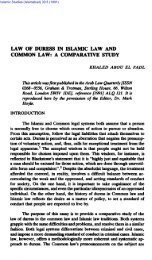doc.pdf
doc.pdf
doc.pdf
You also want an ePaper? Increase the reach of your titles
YUMPU automatically turns print PDFs into web optimized ePapers that Google loves.
THE GRECO-SYRIAC AND ARABIC SOURCES OF BARHEBRAEUS' MINERALOGY 223<br />
kad napel b-'ubkh, mzT' I&. akma d-men batar nupp3sa d-tepshurt2, kad napla ruha<br />
b-shalpuhtii, rtita hawya. ... (3) Anaksimenis amar d-rishe d-ture - hanaw q6lbn6 q-<br />
I-hen - hden kad naplin, aw kad meshtren men mepa, aw kad men yabbishii@ d-ar'a<br />
metparkkin, 'abdin zaw'ii rl-ar'a. mefful-hade lam b-zabne me@nlye wa-b-zabne daglizDt<br />
mega h2wen.<br />
(la) Anaxagoras of Clazomenae sid: (b) Be- the iisflat it is bomehy air (c)<br />
like leaves which are spread on water and are harnebyil- these, when they are drawn<br />
together, sink - and ~ikegddleaves'~ which are placed on water - these, too, whenlhey<br />
are dramagether, sink in the same wav. (The earth) does not incline downwards,<br />
because it is borne by air, nor is it drive11 upwards, because it is heavy and air cannot<br />
push it much. It follows from (Anaxagoras') word that the earth is in the middle of the<br />
universe [by means] beyond nature.17 (d) He says that the wholeof rhe earth is parus,<br />
(e) but its upper part, on which we live, issalid, because its openings are condensed by<br />
rain. (f) "When a part nf the air falls i n t a ~ ~ ) [he " . says] "as it strives to rise<br />
upwards, it passes through the openings which are [in the part] below because its lower<br />
side is porous. (g) As, however, it cannatpassuplrarards through those (openings) above<br />
hecause of their solidity, (h) it moves and shakes the earth." ...<br />
(2a) &&tus says: The~ls~f_the~arslfull of water. (b) When rains occur,<br />
the rain wakr descendsta its deph; and when the water incmses (c) anbthebwels of<br />
the ead~ cannot contain it, (d) h bm- (e) andas it is squxzd, (f) it<br />
causes the movementand shaking of-. He says that this occurs also when the<br />
earth is dry. "For as it becomes" [he says] "(the earth) attracts moisture towards itself<br />
with a certain yearning, and that thing which is attriicted, as it falls into the bowels of<br />
(the earth), moves (the earth)," just as after the discharge of urine, too, when wind falls<br />
into the bladder, a trembling occurs.'' ...<br />
(3a) Anaximenes says: Whenae tapsnf_mauntains - he calls them 'kolonoi' - (c) fall,<br />
(a) either when l d b y rain, (b) or whenhmkeq-b&the dryness of the earth. (d)<br />
they cause the movement of theearth. For this reason, movements of the earth occur in<br />
rainy seasons and in seasons of absence of rain.<br />
We see here how Barhebraeus shortens the passage in his source by omitting<br />
what he considered unnecessary for his purpose. In the theory of Anaxagoras, for<br />
example, he retains only one of the two examples of things floating on waterI9<br />
and omits altogether the sentence in Nic. describing how according to Anaxagoras<br />
the earth remains suspended in air, which is not immediately relevant to the<br />
discussion of how earthquakes are caused. Similarly, he omits the latter parts of<br />
theories of Democritus and Anaximenes. We also see how Barhebraeus sometimes<br />
Cf. Arist. Mete. 348a 8- 10 (in discussion of how hail can be suspended in air): ljorcEp ~ ai txi<br />
,106 &TO< yii ~ ai ~pu&< &a pi~poptpe~av xo&iry EEL~J~OWLV.<br />
This first part of the passage of Nic. dealing with Anaxagoras' thwry has no counterpart in<br />
Arist. Mete., but, as noted by BakoS in connection with the passage of Cd., is based on<br />
Arist. De caelo 11.1 3.<br />
The comparison here with trembling after urination is taken from a later passage at Arist. 366b<br />
19t-f.<br />
At Bur. Min. 2.1.1, BH retains the other example, that of the leaf.
















